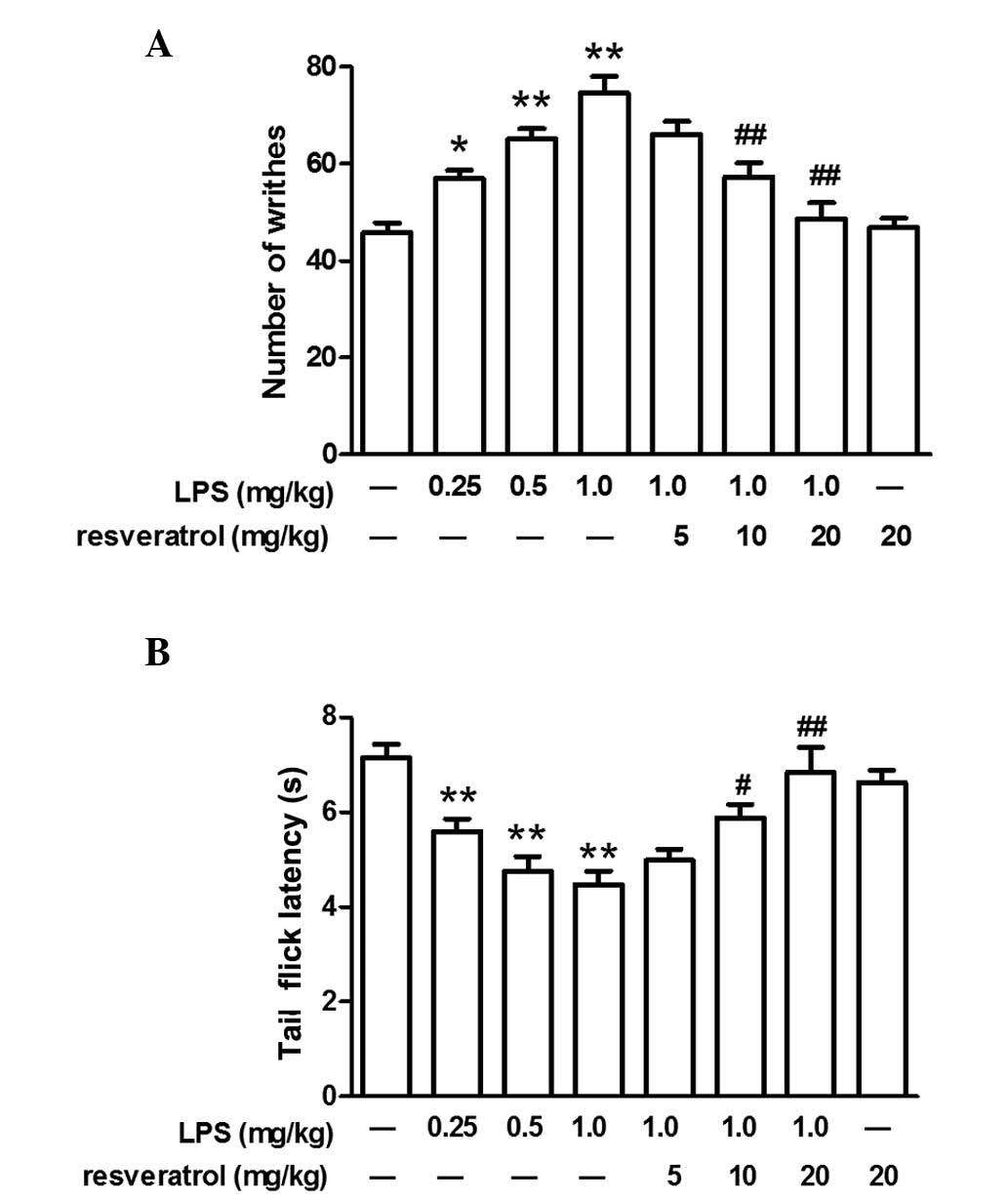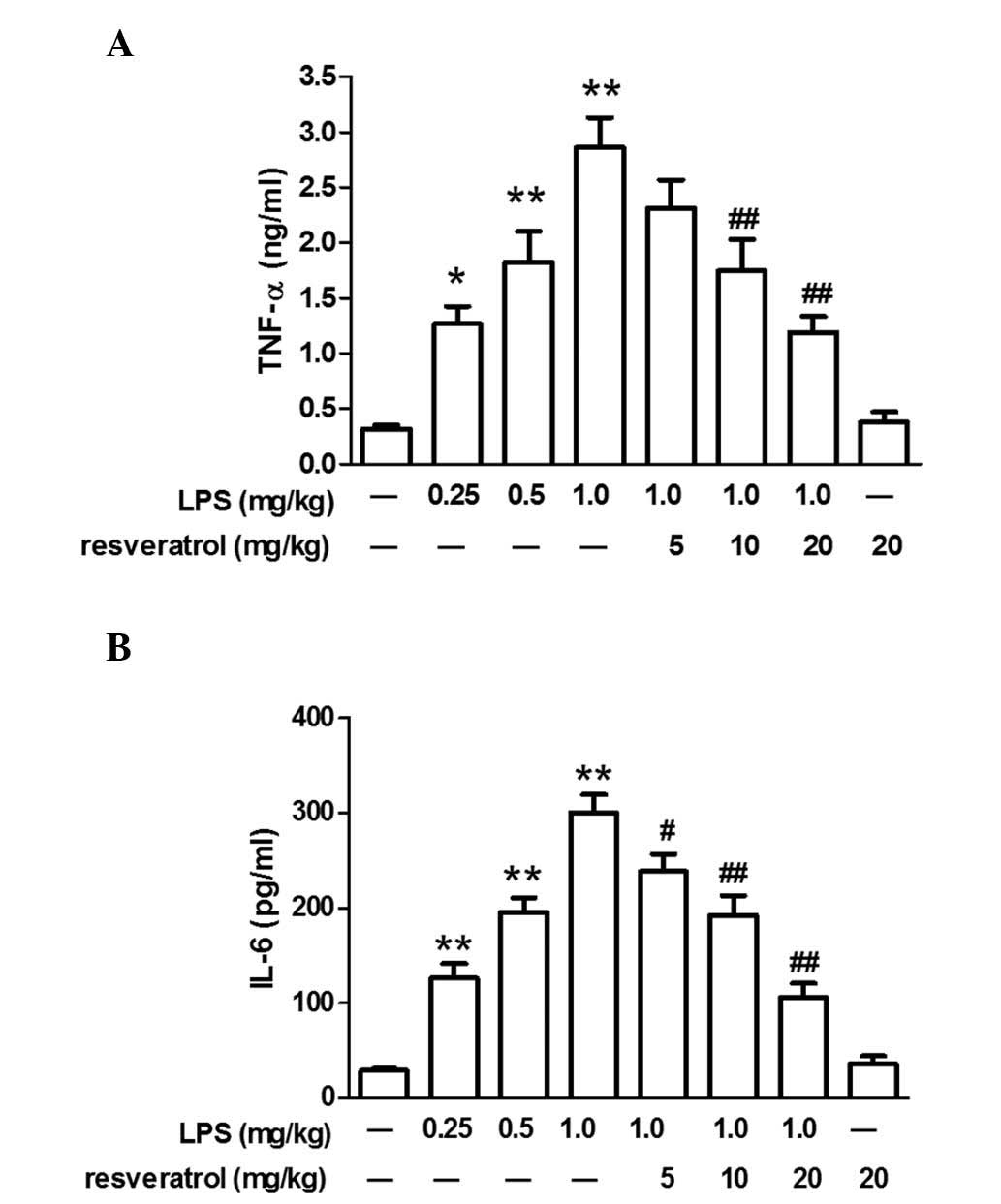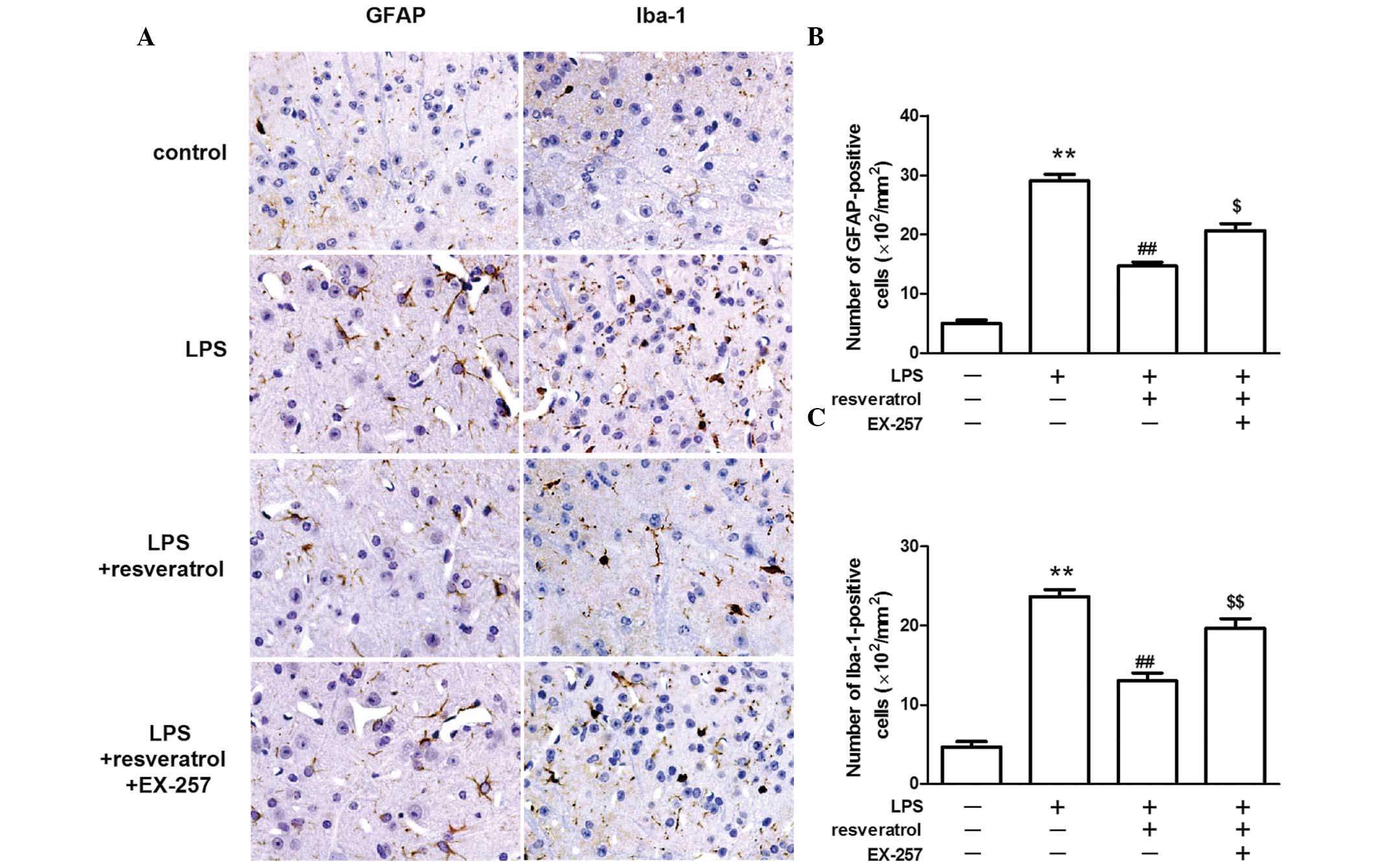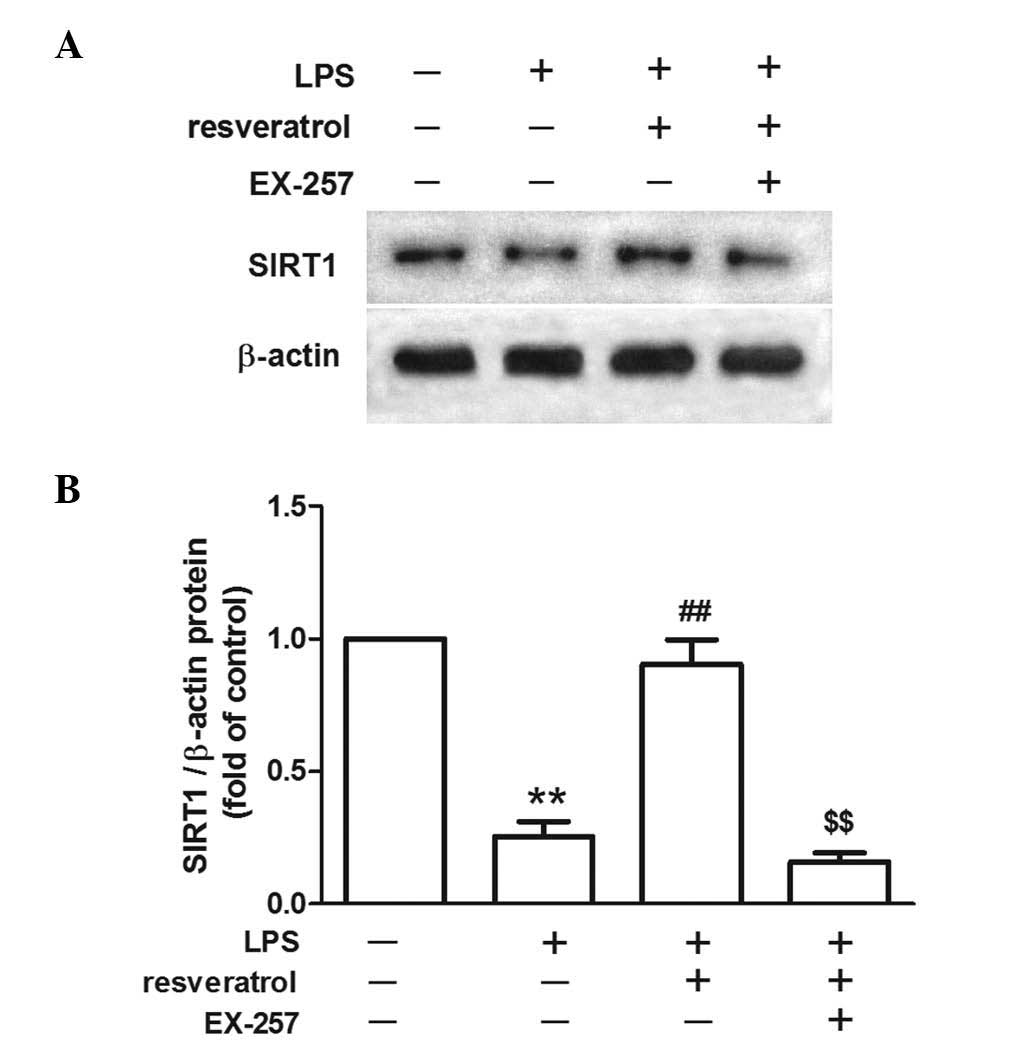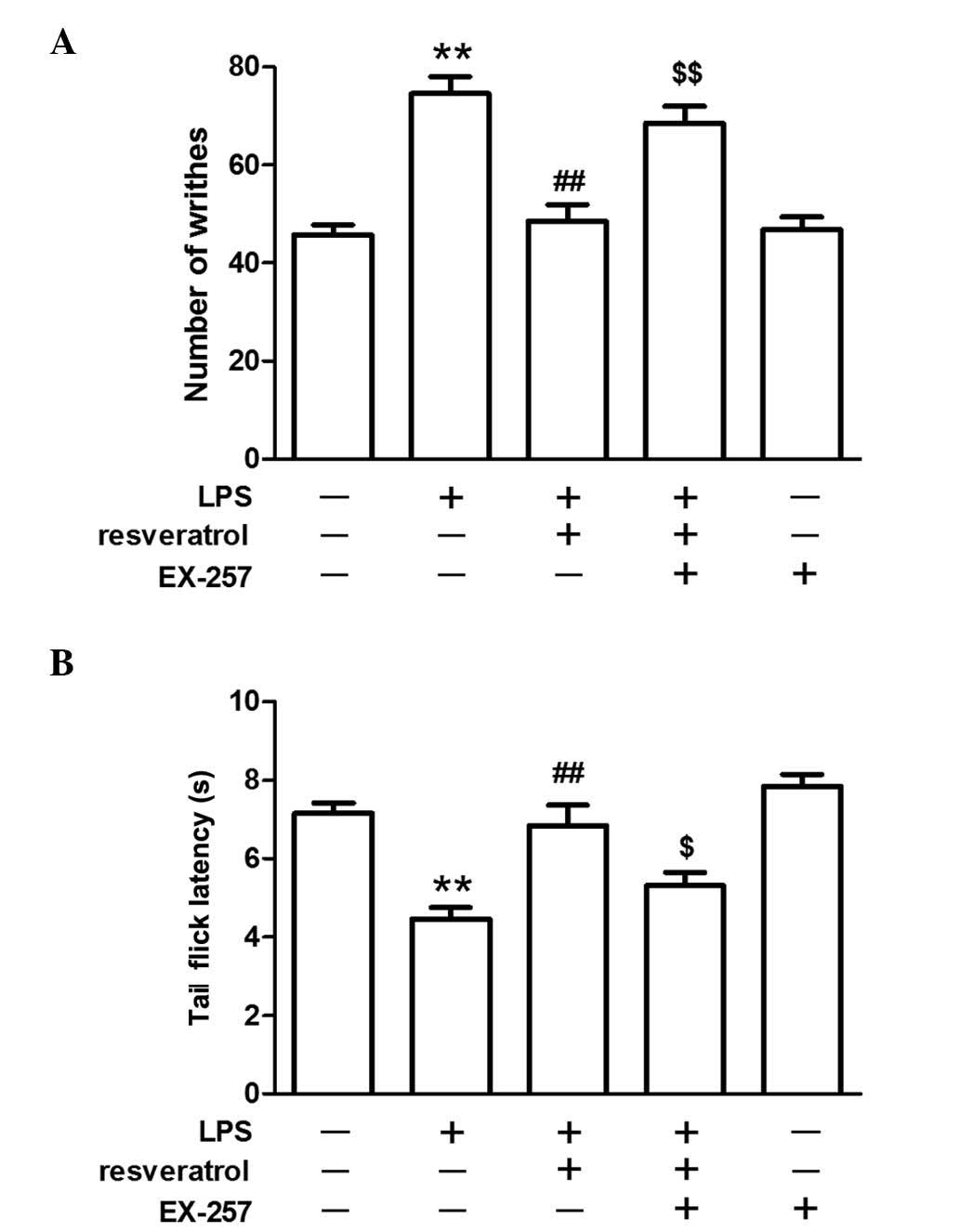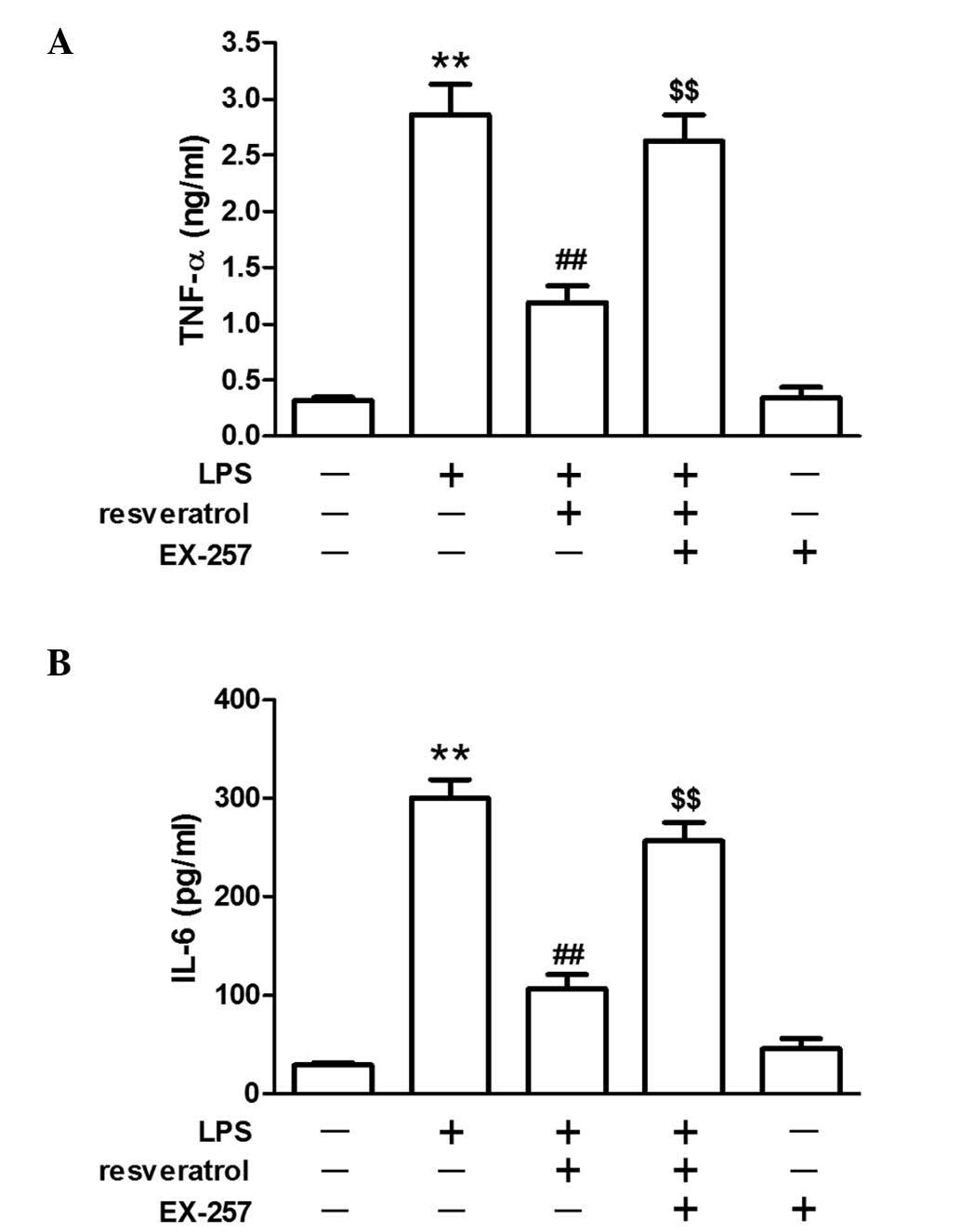|
1
|
Watkins LR and Maier SF: Immune regulation
of central nervous system functions: From sickness responses to
pathological pain. J Intern Med. 257:139–155. 2005. View Article : Google Scholar : PubMed/NCBI
|
|
2
|
Schinkel C, Gaertner A, Zaspel J, Zedler
S, Faist E and Schuermann M: Inflammatory mediators are altered in
the acute phase of posttraumatic complex regional pain syndrome.
Clin J Pain. 22:235–239. 2006. View Article : Google Scholar : PubMed/NCBI
|
|
3
|
Koch A, Zacharowski K, Boehm O, Stevens M,
Lipfert P, von Giesen HJ, Wolf A and Freynhagen R: Nitric oxide and
pro-inflammatory cytokines correlate with pain intensity in chronic
pain patients. Inflamm Res. 56:32–37. 2007. View Article : Google Scholar : PubMed/NCBI
|
|
4
|
Jiang YH, Peng CH, Liu HT and Kuo HC:
Increased pro-inflammatory cytokines, C-reactive protein and nerve
growth factor expressions in serum of patients with interstitial
cystitis/bladder pain syndrome. PLoS One. 8:e767792013. View Article : Google Scholar : PubMed/NCBI
|
|
5
|
Sandhir R, Gregory E, He YY and Berman NE:
Upregulation of inflammatory mediators in a model of chronic pain
after spinal cord injury. Neurochem Res. 36:856–862. 2011.
View Article : Google Scholar : PubMed/NCBI
|
|
6
|
Laird BJ, McMillan DC, Fayers P, Fearon K,
Kaasa S, Fallon MT and Klepstad P: The systemic inflammatory
response and its relationship to pain and other symptoms in
advanced cancer. Oncologist. 18:1050–1055. 2013. View Article : Google Scholar : PubMed/NCBI
|
|
7
|
Sun AY, Wang Q, Simonyi A and Sun GY:
Resveratrol as a therapeutic agent for neurodegenerative diseases.
Mol Neurobiol. 41:375–383. 2010. View Article : Google Scholar : PubMed/NCBI
|
|
8
|
Pangeni R, Sahni JK, Ali J, Sharma S and
Baboota S: Resveratrol: Review on therapeutic potential and recent
advances in drug delivery. Expert Opin Drug Deliv. 11:1285–1298.
2014. View Article : Google Scholar : PubMed/NCBI
|
|
9
|
Cheng W, Zhao Y, Liu H, Fan Q, Lu FF, Li
J, Yin Q and Yan CD: Resveratrol attenuates bone cancer pain
through the inhibition of spinal glial activation and CX3CR1
upregulation. Fundam Clin Pharmacol. 28:661–670. 2014. View Article : Google Scholar : PubMed/NCBI
|
|
10
|
Sharma S, Kulkarni SK and Chopra K: Effect
of resveratrol, a polyphenolic phytoalexin, on thermal hyperalgesia
in a mouse model of diabetic neuropathic pain. Fundam Clin
Pharmacol. 21:89–94. 2007. View Article : Google Scholar : PubMed/NCBI
|
|
11
|
Falchi M, Bertelli A, Galazzo R, Viganò P
and Dib B: Central antalgic activity of resveratrol. Arch Ital
Biol. 148:389–396. 2010.
|
|
12
|
Švajger U and Jeras M: Anti-inflammatory
effects of resveratrol and its potential use in therapy of
immune-mediated diseases. Int Rev Immunol. 31:202–222. 2012.
View Article : Google Scholar : PubMed/NCBI
|
|
13
|
Institute of Laboratory Animal Resources
(US); Committee on Care Use of Laboratory Animals National
Institutes of Health (US); Division of Research Resources: Guide
for the care and use of laboratory animals. 8th edition. National
Academies Press; Washington, DC: 2011
|
|
14
|
Zhao H, Luo F, Li H, Zhang L, Yi Y and Wan
J: Antinociceptive effect of tetrandrine on LPS-induced
hyperalgesia via the inhibition of IKKβ phosphorylation and the
COX-2/PGE2 pathway in mice. PLoS One. 9:e945862014.
View Article : Google Scholar
|
|
15
|
Sora I, Takahashi N, Funada M, Ujike H,
Revay RS, Donovan DM, Miner LL and Uhl GR: Opiate receptor knockout
mice define mu receptor roles in endogenous nociceptive responses
and morphine-induced analgesia. Proc Natl Acad Sci USA.
94:1544–1549. 1997. View Article : Google Scholar : PubMed/NCBI
|
|
16
|
Clark MR: Targeting systemic inflammation
in patients with obesity-related pain: How best to prevent acute
pain from becoming chronic? J Fam Pract. 62(9 Suppl CHPP): S3–S9.
2013.PubMed/NCBI
|
|
17
|
Ribeiro RA, Vale ML, Thomazzi SM,
Paschoalato AB, Poole S, Ferreira SH and Cunha FQ: Involvement of
resident macrophages and mast cells in the writhing nociceptive
response induced by zymosan and acetic acid in mice. Eur J
Pharmacol. 387:111–118. 2000. View Article : Google Scholar : PubMed/NCBI
|
|
18
|
Jha MK, Seo M, Kim JH, Kim BG, Cho JY and
Suk K: The secretome signature of reactive glial cells and its
pathological implications. Biochim Biophys Acta. 1834:2418–2428.
2013. View Article : Google Scholar
|
|
19
|
Gwak YS, Kang J, Unabia GC and Hulsebosch
CE: Spatial and temporal activation of spinal glial cells: Role of
gliopathy in central neuropathic pain following spinal cord injury
in rats. Exp Neurol. 234:362–372. 2012. View Article : Google Scholar :
|
|
20
|
Parpura V, Heneka MT, Montana V, Oliet SH,
Schousboe A, Haydon PG, Stout RF Jr, Spray DC, Reichenbach A,
Pannicke T, et al: Glial cells in (patho)physiology. J Neurochem.
121:4–27. 2012. View Article : Google Scholar : PubMed/NCBI
|
|
21
|
Watkins LR and Maier SF: Beyond neurons:
Evidence that immune and glial cells contribute to pathological
pain states. Physiol Rev. 82:981–1011. 2002. View Article : Google Scholar : PubMed/NCBI
|
|
22
|
Barragán-Iglesias P, Pineda-Farias JB,
Cervantes-Durán C, Bravo-Hernández M, Rocha-González HI, Murbartián
J and Granados-Soto V: Role of spinal P2Y6 and P2Y11 receptors in
neuropathic pain in rats: Possible involvement of glial cells. Mol
Pain. 10:292014. View Article : Google Scholar : PubMed/NCBI
|
|
23
|
Ji XT, Qian NS, Zhang T, Li JM, Li XK,
Wang P, Zhao DS, Huang G, Zhang L, Fei Z, et al: Spinal astrocytic
activation contributes to mechanical allodynia in a rat
chemotherapy-induced neuropathic pain model. PLoS One.
8:e607332013. View Article : Google Scholar : PubMed/NCBI
|
|
24
|
Chen FL, Dong YL, Zhang ZJ, Cao DL, Xu J,
Hui J, Zhu L and Gao YJ: Activation of astrocytes in the anterior
cingulate cortex contributes to the affective component of pain in
an inflammatory pain model. Brain Res Bull. 87:60–66. 2012.
View Article : Google Scholar
|
|
25
|
Feng QX, Wang W, Feng XY, Mei XP, Zhu C,
Liu ZC, Li YQ, Dou KF and Zhao QC: Astrocytic activation in
thoracic spinal cord contributes to persistent pain in rat model of
chronic pancreatitis. Neuroscience. 167:501–509. 2010. View Article : Google Scholar : PubMed/NCBI
|
|
26
|
Cui J, He W, Yi B, Zhao H, Lu K, Ruan H
and Ma D: mTOR pathway is involved in ADP-evoked astrocyte
activation and ATP release in the spinal dorsal horn in a rat
neuropathic pain model. Neuroscience. 275:395–403. 2014. View Article : Google Scholar : PubMed/NCBI
|
|
27
|
Shen W, Hu XM, Liu YN, Han Y, Chen LP,
Wang CC and Song C: CXCL12 in astrocytes contributes to bone cancer
pain through CXCR4-mediated neuronal sensitization and glial
activation in rat spinal cord. J Neuroinflammation. 11:752014.
View Article : Google Scholar : PubMed/NCBI
|
|
28
|
Vega-Avelaira D, Ballesteros JJ and
López-García JA: Inflammation-induced hyperalgesia and spinal
microglia reactivity in neonatal rats. Eur J Pain. 17:1180–1188.
2013. View Article : Google Scholar : PubMed/NCBI
|
|
29
|
Xu ZZ, Berta T and Ji RR: Resolvin E1
inhibits neuropathic pain and spinal cord microglial activation
following peripheral nerve injury. J Neuroimmune Pharmacol.
8:37–41. 2013. View Article : Google Scholar :
|
|
30
|
Moss A, Beggs S, Vega-Avelaira D, Costigan
M, Hathway GJ, Salter MW and Fitzgerald M: Spinal microglia and
neuropathic pain in young rats. Pain. 128:215–224. 2007. View Article : Google Scholar
|
|
31
|
Guo J, Jia D, Jin B, Xu F, Yuan X and Shen
H: Effects of glial cell line-derived neurotrophic factor
intrathecal injection on spinal dorsal horn glial fibrillary acidic
protein expression in a rat model of neuropathic pain. Int J
Neurosci. 122:388–394. 2012. View Article : Google Scholar : PubMed/NCBI
|
|
32
|
Blum E, Procacci P, Conte V and Hanani M:
Systemic inflammation alters satellite glial cell function and
structure. A possible contribution to pain. Neuroscience.
274:209–217. 2014. View Article : Google Scholar : PubMed/NCBI
|
|
33
|
Cao FL, Xu M, Wang Y, Gong KR and Zhang
JT: Tanshinone IIA attenuates neuropathic pain via inhibiting glial
activation and immune response. Pharmacol Biochem Behav. 128:1–7.
2015. View Article : Google Scholar
|
|
34
|
Silva GD, Lopes PS, Fonoff ET and Pagano
RL: The spinal anti-inflammatory mechanism of motor cortex
stimulation: Cause of success and refractoriness in neuropathic
pain? J Neuroinflammation. 12:102015. View Article : Google Scholar : PubMed/NCBI
|
|
35
|
Zhu MD, Zhao LX, Wang XT, Gao YJ and Zhang
ZJ: Ligustilide inhibits microglia-mediated proinflammatory
cytokines production and inflammatory pain. Brain Res Bull.
109:54–60. 2014. View Article : Google Scholar : PubMed/NCBI
|
|
36
|
Clark AK, Staniland AA, Marchand F, Kaan
TK, McMahon SB and Malcangio M: P2X7-dependent release of
interleukin-1beta and nociception in the spinal cord following
lipopolysaccharide. J Neurosci. 30:573–582. 2010. View Article : Google Scholar : PubMed/NCBI
|
|
37
|
Luo XY, Qu SL, Tang ZH, Zhang Y, Liu MH,
Peng J, Tang H, Yu KL, Zhang C, Ren Z and Zhang ZS: SIRT1 in
cardiovascular aging. Clin Chim Acta. 437:106–114. 2014. View Article : Google Scholar : PubMed/NCBI
|
|
38
|
Herskovits AZ and Guarente L: SIRT1 in
neurodevelopment and brain senescence. Neuron. 81:471–483. 2014.
View Article : Google Scholar : PubMed/NCBI
|
|
39
|
Leibiger IB and Berggren PO: Sirt1: A
metabolic master switch that modulates lifespan. Nat Med. 12:34–36.
2006. View Article : Google Scholar : PubMed/NCBI
|
|
40
|
Kalle AM, Mallika A, Badiger J, Alinakhi,
Talukdar P and Sachchidanand: Inhibition of SIRT1 by a small
molecule induces apoptosis in breast cancer cells. Biochem Biophys
Res Commun. 401:13–19. 2010. View Article : Google Scholar : PubMed/NCBI
|
|
41
|
He X, Ou P, Wu K, Huang C, Wang Y, Yu Z
and Guo Q: Resveratrol attenuates morphine antinociceptive
tolerance via SIRT1 regulation in the rat spinal cord. Neurosci
Lett. 566:55–60. 2014. View Article : Google Scholar : PubMed/NCBI
|
|
42
|
Yin Q, Lu FF, Zhao Y, Cheng MY, Fan Q, Cui
J, Liu L, Cheng W and Yan CD: Resveratrol facilitates pain
attenuation in a rat model of neuropathic pain through the
activation of spinal Sirt1. Reg Anesth Pain Med. 38:93–99. 2013.
View Article : Google Scholar : PubMed/NCBI
|
|
43
|
Shao H, Xue Q, Zhang F, Luo Y, Zhu H,
Zhang X, Zhang H, Ding W and Yu B: Spinal SIRT1 activation
attenuates neuropathic pain in mice. PLoS One. 9:e1009382014.
View Article : Google Scholar : PubMed/NCBI
|
|
44
|
Winnik S, Stein S and Matter CM: SIRT1-an
anti-inflammatory pathway at the crossroads between metabolic
disease and atherosclerosis. Curr Vasc Pharmacol. 10:693–696. 2012.
View Article : Google Scholar : PubMed/NCBI
|
|
45
|
Xie J, Zhang X and Zhang L: Negative
regulation of inflammation by SIRT1. Pharmacol Res. 67:60–67. 2013.
View Article : Google Scholar
|
|
46
|
Joe IS, Jeong SG and Cho GW:
Resveratrol-induced SIRT1 activation promotes neuronal
differentiation of human bone marrow mesenchymal stem cells.
Neurosci Lett. 584:97–102. 2015. View Article : Google Scholar
|
|
47
|
Li L, Sun Q, Li Y, Yang Y, Yang Y, Chang
T, Man M and Zheng L: Overexpression of SIRT1 Induced by
resveratrol and inhibitor of miR-204 suppresses activation and
proliferation of microglia. J Mol Neurosci. 56:858–867. 2015.
View Article : Google Scholar : PubMed/NCBI
|
|
48
|
Sin TK, Tam BT, Yung BY, Yip SP, Chan LW,
Wong CS, Ying M, Rudd JA and Siu PM: Resveratrol protects against
doxorubicin-induced cardiotoxicity in aged hearts through the
SIRT1-USP7 axis. J Physiol. 593:1887–1899. 2015. View Article : Google Scholar : PubMed/NCBI
|
|
49
|
Han Y, Jiang C, Tang J, Wang C, Wu P,
Zhang G, Liu W, Jamangulova N, Wu X and Song X: Resveratrol reduces
morphine tolerance by inhibiting microglial activation via AMPK
signalling. Eur J Pain. 18:1458–1470. 2014. View Article : Google Scholar : PubMed/NCBI
|
|
50
|
Zong Y, Sun L, Liu B, Deng YS, Zhan D,
Chen YL, He Y, Liu J, Zhang ZJ, Sun J and Lu D: Resveratrol
inhibits LPS-induced MAPKs activation via activation of the
phosphatidylinositol 3-kinase pathway in murine RAW 264.7
macrophage cells. PLoS One. 7:e441072012. View Article : Google Scholar : PubMed/NCBI
|
|
51
|
Centeno-Baez C, Dallaire P and Marette A:
Resveratrol inhibition of inducible nitric oxide synthase in
skeletal muscle involves AMPK but not SIRT1. Am J Physiol
Endocrinol Metab. 301:E922–E930. 2011. View Article : Google Scholar : PubMed/NCBI
|
|
52
|
Yang H, Zhang W, Pan H, Feldser HG, Lainez
E, Miller C, Leung S, Zhong Z, Zhao H, Sweitzer S, et al: SIRT1
activators suppress inflammatory responses through promotion of p65
deacetylation and inhibition of NF-kappaB activity. PLoS One.
7:e463642012. View Article : Google Scholar
|
|
53
|
Park GJ, Kim YS, Kang KL, Bae SJ, Baek HS,
Auh QS, Chun YH, Park BH and Kim EC: Effects of sirtuin 1
activation on nicotine and lipopolysaccharide-induced cytotoxicity
and inflammatory cytokine production in human gingival fibroblasts.
J Periodontal Res. 48:483–492. 2013. View Article : Google Scholar
|















